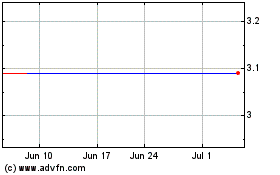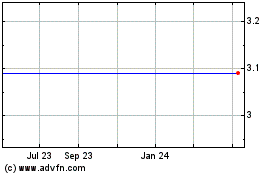RBS to Compensate Small-Business Customers --Update
November 08 2016 - 3:57AM
Dow Jones News
By Max Colchester
LONDON-- Royal Bank of Scotland Group PLC said Tuesday it was
setting aside GBP400 million ($496.2 million) to compensate
small-business owners who alleged they were pushed into default by
the bank's restructuring unit.
The bank said it was creating a system to refund fees extracted
from struggling small businesses that were put into its Global
Restructuring Group in the aftermath of the financial crisis.
Hundreds of small-business owners alleged that GRG forced them to
default on loans so that the bank could charge higher fees or seize
their properties and sell them.
An initial report by the U.K.'s Financial Conduct Authority on
Tuesday said this wasn't the case, however the regulator did find
that around two thirds of the businesses put in the unit wouldn't
have necessarily failed and most suffered from "some form of
inappropriate action by RBS." The regulator will detail further
actions at a later date.
In a statement, RBS said "it could have done better" in its
treatment of small business customers.
The bank, which is 73%-U.K. government owned, is now putting in
place a complaints process overseen by a former judge to dole out
funds to the companies affected. The there will be an automatic
repayment of fees to businesses that were in GRG between 2008 and
2013. The GBP400 million covers both the compensation and the cost
of setting up the new unit to handle the complaints.
The decision to compensate customers marks a change in tactics
for RBS, which spent years denying it had mistreated small
businesses. The allegations have hung over RBS, proving a thorn in
its side as the bank looks to reshape itself as a U.K. focused
corporate lender.
In 2013 RBS commissioned law firm Clifford Chance to investigate
the allegations. The report said that RBS didn't systematically
defraud customers.
Following the financial crisis the number of customers being
referred to RBS's GRG unit rose. A report commissioned by the bank
on its business lending warned of a potential conflict of interest
at GRG because it selects the struggling businesses it works with
from RBS's larger base of customers, and aims to generate a profit.
The FCA said there was some evidence of this and detailed a litany
of failures including not handling conflicts of interest at its
property unit West Register and not putting too much pressure on
small businesses to pay of debt and hike prices..
RBS closed both GRG and its West Register unit, which both
advises distressed businesses on property matters and bid for their
properties.
The U.K. government rescued RBS with GBP45.5 billion of
taxpayers' money in one of Europe's biggest bank bailouts amid the
financial crisis in 2008. The value of that stake has fallen
sharply since then, particularly in the wake of Britain's
referendum vote to leave the European Union in June this year.
In August, the lender said it would roll out a new cost-cutting
plan after posting a first-half net loss of more than GBP2 billion
amid ultralow U.K. interest rates and uncertainty over Brexit.
Write to Max Colchester at max.colchester@wsj.com
(END) Dow Jones Newswires
November 08, 2016 03:42 ET (08:42 GMT)
Copyright (c) 2016 Dow Jones & Company, Inc.
Royal Bank of Scotland (NYSE:RBS)
Historical Stock Chart
From Mar 2024 to Apr 2024

Royal Bank of Scotland (NYSE:RBS)
Historical Stock Chart
From Apr 2023 to Apr 2024
